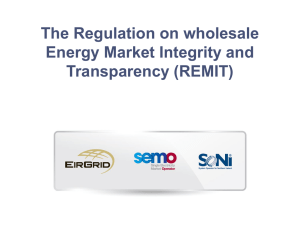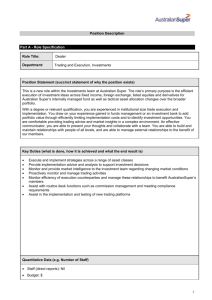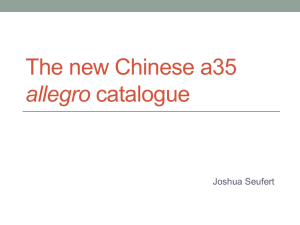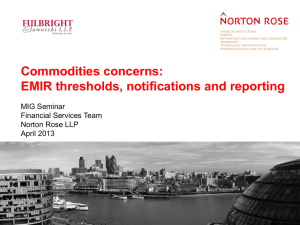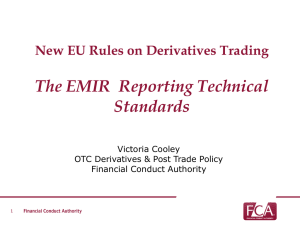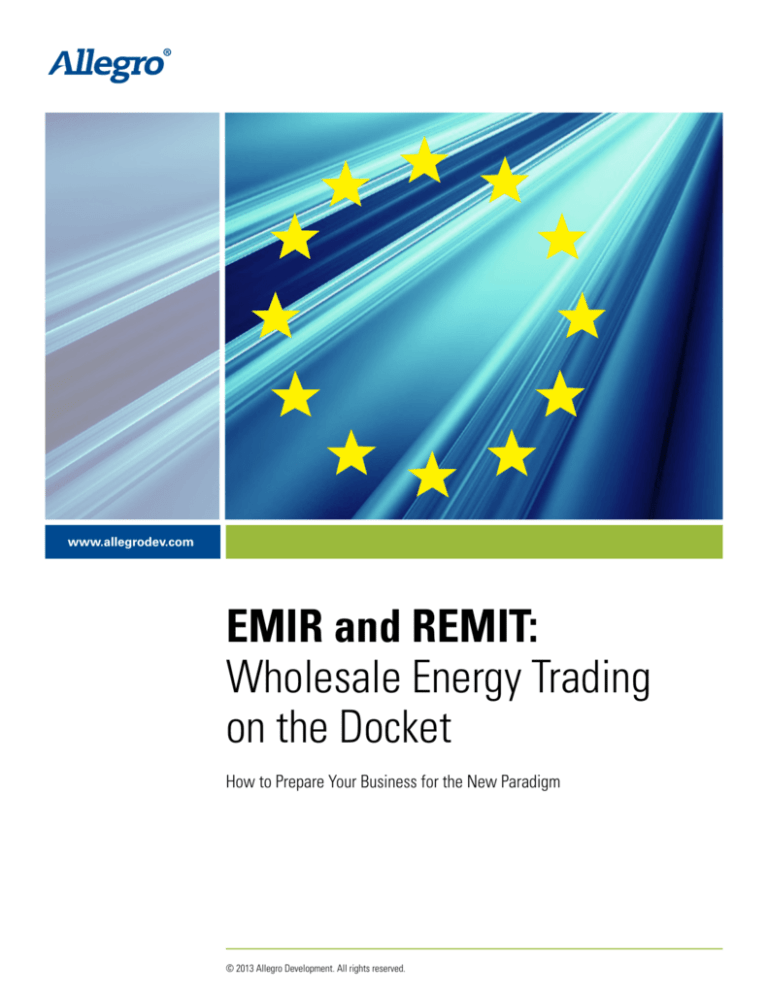
www.allegrodev.com
EMIR and REMIT:
Wholesale Energy Trading
on the Docket
How to Prepare Your Business for the New Paradigm
© 2013 Allegro Development. All rights reserved.
Introduction
At a Glance
EMIR - European Market
Infrastructure Regulation
»» Most standardized derivative
contracts to clear through
central counterparties (CCP).
»» Non-financial counterparties
clear centrally only beyond
“clearing threshold”.
»» All derivative contracts reported to European Securities
and Markets Authority (ESMA)
trade repository.
»» All counterparties pay into
CCP-managed default fund.
»» Daily margining &
collateralization of positions.
REMIT - Regulation on
Wholesale Energy Market
Integrity and Transparency
»» Publishing all energy-related
inside information to Agency
for the Cooperation of Energy
Regulators (ACER).
»» Contracts for gas and
electricity, commodity and
transportation, including
derivatives.
»» Energy market participants
register with regulators and
report transaction details.
The clock is ticking on new regulations governing the way companies report, clear, track
and manage derivatives, along with power and gas trading, throughout the European
Union. Specifically, two pieces of legislation have passed that will affect trading strategies.
The European Market Infrastructure Regulation (EMIR) will require all transactions
involving exchange-traded and over-the-counter derivatives to be reported to trade
repositories for the purpose of ensuring public transparency and accountability in the
marketplace. Akin to the Dodd-Frank legislation passed in the US in 2010, EMIR will
require energy companies operating in the EU to:
• Report trade details to authorized trade repositories in a timely manner.
• Monitor positions against the clearing threshold and clear future contracts if the
threshold is exceeded.
• Mitigate risk through timely confirmations and periodic trade reconciliation.
The Regulation on Wholesale Energy Market Integrity and Transparency (REMIT)
applies to power and gas transactions. This legislation is intended to remove insider trading
and market manipulation abuses in the wholesale energy market. REMIT will require:
• All inside information related to wholesale energy products be published.
• The European energy regulatory authority to monitor wholesale energy markets.
• Energy market participants to register with national regulators and report energy
transaction details to the authorities.
Together, these two laws introduce sweeping changes in the way the EU financial sector
will be regulated and monitored, effectively changing the game for energy traders across
the continent.
This whitepaper will review the implications of the pending regulations, and present a
case for automation as a value-added solution to ensuring compliance, reducing error and
streamlining the reporting, clearing and reconciliation process.
»» Utility companies disclose any
details affecting price.
www.allegrodev.com
EMIR and REMIT: Wholesale Energy Trading on the Docket
Page 2/9
Change in the Energy Trading Landscape
To appreciate the value an automated trade management system can add to an energy
company operating in the EU beyond the EMIR/REMIT regulatory deadlines (presently
set for Q1, 2014), it is instructive to first take a closer look at each of the proposed regulations.
Implications of EMIR
The broader of the two legislations is EMIR, which is aimed at reducing counterparty
and systemic risk in OTC trading and improving transparency in the system. After the
banking and securities financial crisis of 2008, G20 countries ratified an agreement at the
Pittsburgh Summit in 2009 that stated:
“All OTC derivative contracts should be traded on exchanges or electronic
trading platforms, where appropriate, and cleared through central counterparties by end-2012 at the latest. OTC derivative contracts should be reported to trade repositories. Non-centrally cleared contracts should be subject to
higher capital requirements.”
EMIR was drafted to fulfill Europe’s obligations under the G20 agreement. This legislation
encompasses both financial counterparties, such as banks, insurers and asset managers, as
well as to non-financial counterparties.
First, most standardized derivative contracts will be required to be cleared through central
counterparties (CCPs). In the case of non-financial counterparties, only companies that
exceed a “clearing threshold” will be required to have their contracts centrally cleared.
This necessarily means that non-financial counterparties dealing in derivative contracts
must employ some measure of active monitoring of their traded position against this threshold to preserve the clearing exemptions and avoid the potential burden of the clearing
requirement.
Second, all derivative contracts must be reported to a qualified European Securities and
Markets Authority (ESMA) trade repository. This means that daily reporting procedures
must be in place to ensure proper notification on all contracts in a timely and efficient
manner.
Third, risk mitigation on any cleared OTC derivative contract will now require all
counterparties to pay into a default fund managed by the CCPs. As such, counterparties
will be subject to daily margining and collateralization of their positions with the CCP,
using highly liquid collateral, such as cash, gold or government bonds. As a result,
traders will have to assess daily funding needs and adapt a collateral management strategy
to match their portfolio volume.
www.allegrodev.com
EMIR and REMIT: Wholesale Energy Trading on the Docket
Page 3/9
Implications of REMIT
Regarding wholesale gas and electricity markets, REMIT outlines new laws to prohibit
insider trading and market manipulation in physical and OTC financial transactions. This
sector-specific legislation was entered in December of 2011 in response to increased crossborder trading and volatility in energy products.
Specifically, REMIT prohibits market participants from using insider information and
market manipulation to acquire or dispose of wholesale energy products, defined as
contracts for gas and electricity, commodity and transportation, including derivatives. All
energy market participants must register with national regulators. Further, all participants
must publicly disclose inside information regarding their business holdings, operations
and capacity plans to the Agency for the Cooperation of Energy Regulators (ACER),
Europe’s energy regulatory authority. According to REMIT, “inside information” is
generally considered to be any private information that, if made public, might affect the
price of a wholesale energy product. More exactly, REMIT stipulates that reported data
should include:
“…the precise identification of the wholesale energy products bought and
sold, the price and quantity agreed, the dates and times of execution, the
parties to the transaction and the beneficiaries of the transaction and any
other relevant information…”
To ensure compliance, energy companies will not only have to functionally collect, store
and make accessible ongoing and historic trade data, but also fundamental business data
such as load, generation and transmission information, including fuel prices. Further,
utility companies will have to disclose the timing of planned power outages, as well as
pipeline bottlenecks and field maintenance, as these details may affect pricing. As a result,
full integration of trading activities with compliance management will become essential
to survival after the deadline.
www.allegrodev.com
EMIR and REMIT: Wholesale Energy Trading on the Docket
Page 4/9
How EMIR/REMIT
Affect Energy Companies
Three Key EMIR/REMIT
Compliance Considerations
Reporting
»» Identity Transactions
»» Connect to Repositories
»» Transmit Daily
Clearing
»» Manage Collateral
»» Assess Daily Funding
»» Manage Risk
Reconciliation
»» Integrate with Governing
Authorities
»» Report Internal Information
»» Resolve Disputes
The consequence of EMIR and REMIT combined will fundamentally change the way
energy companies operate in the European Union. As a result, three major considerations
are on the table for entities affected by the legislation.
1. How will you handle the required transaction reporting?
There may be no simple answer to this question. All trading activity for the day must
be reported to trading repositories, with records kept for regulatory access on request.
Under REMIT, wholesale power and natural gas products, including price, quantity, date
and time of trades must be reported to ACER, including transaction and order records,
confirmations and scheduling/nomination information. With EMIR, the legislation
affects all derivative contracts, including interest rate, credit, foreign exchange, commodity
and equity derivatives.
The complexity of the recordkeeping, the need to store data securely and the speed and
accuracy with which the data must be submitted suggests electronic reporting as a viable
solution. Leading up to the deadlines, companies affected by the EMIR/REMIT should
begin implementing effective systems capable of:
• Identifying which transactions to report, along with the required information.
• Connecting securely to the appropriate trade repositories.
• Creating and transmitting the required files on a daily basis.
Any delay to act could cause a severe impediment to doing business for organizations not
equipped to handle the requirements come the impending deadlines.
2. How will you manage trades under the new centralized counterparty clearing
restrictions?
The EMIR requirements state that standard derivative contracts must be centrally cleared.
Further, non-centrally cleared derivatives, if large enough, will require additional capital
for collateral. Assessing which contracts are subject to the clearing mandate adds to
the complexity of the operational management of derivative contracts, not to mention
concerns over any funding necessary to operate within compliance.
www.allegrodev.com
EMIR and REMIT: Wholesale Energy Trading on the Docket
Page 5/9
Considering that all standard and sufficiently liquid derivatives must be traded on an
exchange or electronic trading platform, now is the time to prepare. Your system must be
equipped to:
• Monitor and manage collateral requirements.
• Assess your daily funding needs.
• Manage risk on your derivative positions in relation to trade, pricing, valuation and
collateral thresholds.
The complexity of these requirements may suggest an automated solution as the best
means of compliance.
3. How will you effectively reconcile your trades with the approved authorities?
Given that all market participants must now be registered with national regulatory
authorities, the question of connectivity, security and timeliness will necessarily shape
your process and technology decisions. REMIT requires that all inside trade information
be publicly disclosed, and that all trade information be provided to ACER transparently
and without delay. EMIR requires confirmation of all contracts be reported within at least
one business day, with reconciliation performed either on a daily, weekly or quarterly
depending on the level of transactional activity with each counterparty. These requirements will absolutely affect your business model. In response, you must now construct a
reconciliation system that allows you to:
• Integrate trade, post-trade and collateral engines with appropriate trade repositories
and governing authorities.
• Provide internal reporting for insider information on a real-time basis.
• Resolve disputes in a timely manner.
The fact is, not all outsourcing and technology options are equal. With Q1, 2014 looming,
the time to investigate, weigh and determine a workable solution is now.
www.allegrodev.com
EMIR and REMIT: Wholesale Energy Trading on the Docket
Page 6/9
The Path of Least Resistance
For more than 29 years, Allegro has been intimately involved in providing enterprise
solutions for power and gas utilities, refiners, producers, traders and commodity consumers
worldwide. We have been tracking the evolution of the EMIR and REMIT legislations
since they emerged during the financial crisis, and in response, have been actively
developing Allegro Derivative Regulation 8.2 solution to support trade reporting requirements under EMIR and REMIT. What’s more, our local offices in the EU are staffed by
knowledgeable industry experts prepared to quickly deploy our solution as part of your
technology stack.
Core to the software is direct connectivity to EU trade repositories, including all required
regulatory identifiers and formats. In addition, the system is designed to simplify threshold
monitoring and facilitate risk mitigation obligations, including periodic portfolio
reconciliations under the new rules.
In short, an integrated solution eliminates the data disconnects and costly errors associated
with spreadsheet and manual processing, protecting your brand reputation as it also saves
time and money.
Compliance Benefits of the Allegro 8.2 Platform Include:
• Transparent views of real-time positions, trades and transactions across all
commodities.
• Documentation of every transaction with a single platform that eliminates dual
entry, improves data accuracy and aggregates all data for complete reporting.
• Trader and position limits to ensure process efficiency and to monitor violations of
limits.
• Ability to measure risk in product, basis, volatility, correlation and portfolio
concentration.
• Timely, accurate credit rating information to enable a unified view of counterparty
credit for physical and financial assets and logistics.
• Ability to manage established margin/capital requirements.
• Valuation of collateral and testing of liquidity procedures to reflect market/credit
risks.
• Complete audit trails to ensure compliance with company strategy and ability for
management to monitor performance, user activity and overall compliance status.
www.allegrodev.com
EMIR and REMIT: Wholesale Energy Trading on the Docket
Page 7/9
More Than a Specialized Compliance Solution
Beyond providing flexible energy trading and risk management functionality, Allegro
technology is designed to support your essential business processes and workflow controls.
You can use Allegro to manage all ETRM activities or seamlessly integrate our Derivative
Regulation 8.2 component software as an extension of your existing enterprise system.
Features and benefits of Derivative Regulation 8.2 include:
www.allegrodev.com
Features
Benefits
Import and view trade and valuation
data
Achieve accuracy in trade records with the ability to easily import and integrate data from
external systems into Allegro.
Automating data aggregation saves
you time by eliminating the need to
re-key data.
Improves the timeliness of the position data and improves the accuracy and completeness
of reports submitted to trade repositories.
Convert trade data to conform to
regulatory standards
Increased efficiency in preparing trade data for submission. Existing Allegro data or
data that has been imported from another source is structured to meet the standards
established for compliance reporting and submission to repositories. Trade data is easily
converted into the format and naming conventions required by regulators. Automating this
process eliminates the need to manually convert individual trades to meet specifications
and helps improve consistency of reporting data.
Manage the data reporting lifecycle
Improved reporting accuracy with automated workflows that streamline reporting
processes so that only verified data is submitted to trade repositories. Similar workflows
apply to any trade revisions, to make sure any event changes in the trade are properly
reported to trade repositories. The system will prompt you when to repeat the process
flow. Improves the accuracy of data prior to submission, which gives risk managers
confidence that they are meeting regulations.
Direct submission to trade
repositories
Simplified, accurate trade report generation with all data housed in one repository. With
support for the entire trade lifecycle and tracking of all details, reporting is automated
and streamlined for submission to trade repositories.
Flexible technology architecture
Readily adapt to new and changing regulatory requirements. Allegro can easily scale and
be modified to support European, US and other regulatory standards as they are finalized
and implemented over time.
Gross notional threshold reporting
Actively mitigate compliance risk. Standard reports facilitate easy monitoring of positions
against the clearing threshold. Notifies when positions are being approached or when the
threshold has been exceeded.
Portfolio reconciliation
Simplify risk mitigation obligations. Manage the process to identify discrepancies with
trading parties and expedite dispute resolution.
EMIR and REMIT: Wholesale Energy Trading on the Docket
Page 8/9
Allegro software is widely accepted as best-in-class throughout the energy sector. Its
advanced .NET architecture and component-based approach delivers a broad set of
physical, financial, logistics and operations components for energy market participants.
As one leading industry analyst from Commodity Technology Advisory notes, Allegro’s
“business process components are truly integrated (versus a set of acquired software
technologies that are ‘integrated’ in name only) and readily extensible to handle each
firm’s unique business requirements. Best of all, all the information that energy companies
will be required to track and report – trades, positions, prices, audit trails, approvals, alerts
and history – can already be handled out-of-the-box in the Allegro system.”
Next Step
The fact is time is running out for companies trading throughout the EU to prepare for
the shockwaves of EMIR and REMIT. In order to be able to clear, reconcile and report
transactions under the new rules, a new business paradigm will be required. Allegro’s
Derivative Regulation 8.2 is already configured to manage the regulatory requirements
out-of-the-box. The path of least resistance is already paved. Contact Allegro for details
today.
About Allegro
Allegro is a global leader in energy trading and risk management solutions for power and
gas utilities, refiners, producers, traders and commodity consumers. With more than
29 years of deep industry expertise, Allegro’s enterprise platform drives profitability and
efficiency across front, middle and back offices, while managing the complex logistics
associated with physical commodities. Allegro provides customers with agile solutions
to manage risk across natural gas, power, coal, crude oil, petroleum products, emissions
and other commodity markets, allowing decision makers to hedge and execute with
confidence. Headquartered in Dallas, Texas, Allegro has offices in Calgary, Houston,
London, Singapore, Sydney and Zurich, along with a global network of partners.
www.allegrodev.com
EMIR and REMIT: Wholesale Energy Trading on the Docket
Page 9/9

